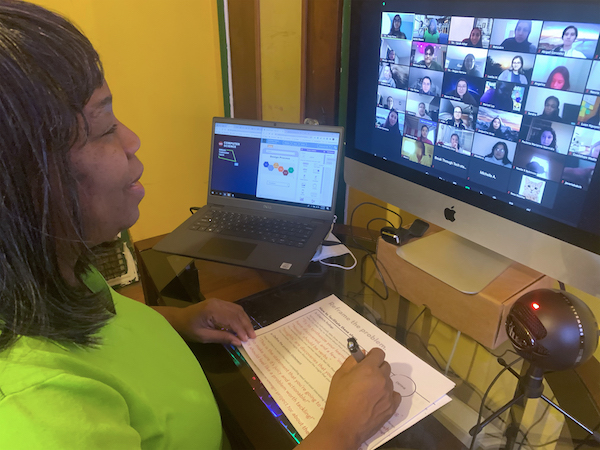For great tech, start with people
For great tech, start with people Heading link

Sometimes, skipping a step is good. You might get done faster, with a little bit less work.
Not so with “design thinking,” a process that 96 Break Through Tech Chicago participants experimented with in Winter Guild.
Design thinking is often called “human-centered design.” It involves understanding what the eventual users of a product or system will really need, then designing a solution based on that. It’s a perfect approach for tackling the serious social problem that Winter Guild students took on: food insecurity in Chicago.
Jackie Moore, one of the three instructors, kept reminding the Guild participants to not jump over the crucial early stages in design thinking.
“Remember, we want to get a picture of who we’re trying to help,” she advised. “Who is the client, and what might they want? Are they the food provider or the person receiving help? Are we looking at a single mom, a college student, or someone who works at a food pantry?”
“Try to understand who this person is and what they might need,” she said. “The solutions will come later.”
Moore’s guidance is rooted in the fact that design thinking begins with a thorough grasp of a person’s issue from their point of view, often via one-on-one interviews and direct observation. Equipped with that information, you can brainstorm. Then you can devise a prototype solution to the person’s problem, test it, and refine it. All of that needs to happen before you can put any plan into action.
Guild, a Break Through Tech Chicago program that allows UIC and community college women to experiment with problem-solving using technology, lasts five days. It’s a short period of time, which means that students—who work together in teams of four—need to follow the design-thinking sequence with creativity and efficiency.
They have help from their instructors, from a group of teaching assistants who are current computer science majors at UIC, and from volunteer mentors from the tech industry.
By the third day of Guild, they were developing a more robust picture of the person they were trying to help: some teams were learning about Chicago residents who need help getting enough high-quality food to eat, and others were learning about the people who run local food banks. By the fifth day, they had taken their new knowledge and come up with apps that could improve their clients’ day-to-day lives. They built prototype versions of the apps in AppLab, which allows even beginner users to design an app and code it using JavaScript.
One team’s app was designed to serve a college student who came to the United States from another country. They imagined that person’s potential language barriers, unfamiliarity with the food products available in the United States, and inexperience with using Chicago public transit to access food sources in other neighborhoods. The tech solution they created had to account for all of these possible issues.
Another team designed their solution for an older person suffering from multiple health challenges whose diet needed to sync with their medications. The group worked on its app knowing that their end user might not be comfortable with technology and might benefit from additional human connection.
In addition to this project, Guild students spent the week learning more about technology, including cybersecurity, tech jobs, and various areas of expertise that fall under the broader umbrella of tech and computer science. It’s the ultimate in learning while doing.
“We have them crossing the bridge while they build it,” Moore said.
Break Through Tech Chicago seeks to create space for women in the tech world by preparing more female college students with a computer science major or minor from UIC. It is part of a national network that started at Cornell Tech and that receives funding from Pivotal Ventures, the Cognizant U.S. Foundation, and Verizon. Learn more about Break Through Tech Chicago programs, including its upcoming three-week Sprinternships.